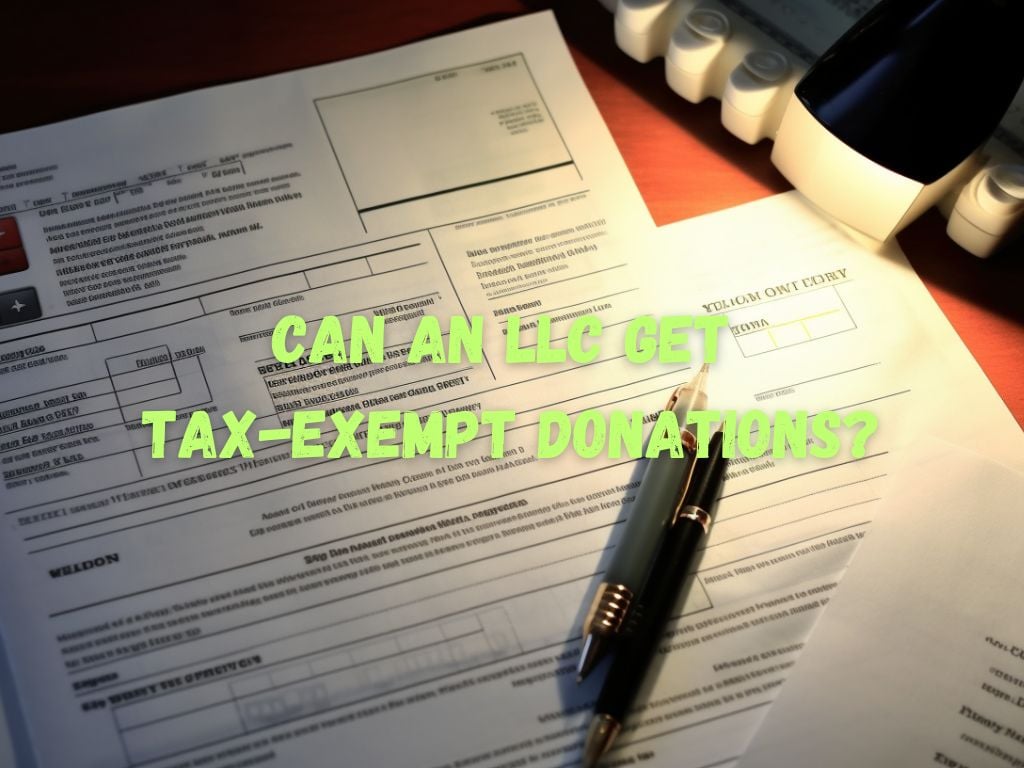Tax-exempt donations play a crucial role in supporting charitable causes and nonprofits. Many business owners wonder if their Limited Liability Company (LLC) can also benefit from tax-exempt donations.
So, can an LLC get tax-exempt donations?
In this article, we will explore the possibility of LLCs receiving tax-exempt donations and the key considerations involved.
Understanding the IRS regulations, requirements, and strategies for maximizing tax benefits can help LLC owners make informed decisions for their businesses.
Can an LLC Get Tax-Exempt Donations?
To determine whether an LLC can accept tax-exempt donations, we need to understand the IRS’s recognition and classification of LLCs.
Generally, the IRS treats LLCs as pass-through entities, meaning that the company’s income is passed through to the owners’ personal tax returns. As a result, LLCs themselves do not typically receive tax-exempt status.
However, there may be opportunities for LLCs to receive tax-exempt donations under certain circumstances.
Eligibility Criteria for Tax-Exempt Donations
While LLCs cannot obtain tax-exempt status, they can still receive tax-exempt donations if they meet the eligibility criteria set by the IRS.
The most common way for an LLC to receive tax-exempt donations is by partnering with a qualified tax-exempt organization, such as a nonprofit or a public charity.
By collaborating with these organizations, LLCs can act as intermediaries, facilitating tax-exempt donations to the qualified entity.

Process for Obtaining Recognition as a Tax-Exempt Entity
For LLCs seeking recognition as tax-exempt entities, there are specific steps to follow. The LLC should first determine under which IRS tax code section it intends to seek tax-exempt status.
Common options include sections 501(c)(3), (c)(4), (c)(6), and (c)(7). Each section has distinct requirements and permissible activities, so careful consideration is necessary to determine the most suitable option for the LLC’s goals.
After identifying the appropriate section, the LLC must prepare and submit the necessary documentation, including Form 1023 or Form 1024, to the IRS.
These forms require detailed information about the LLC’s purpose, activities, governance, financials, and more. Upon review, the IRS will determine whether the LLC qualifies for tax-exempt status.
Limits and Restrictions on Tax-Exempt Donations
Even if an LLC successfully obtains tax-exempt status, there are limits and restrictions on tax-deductible donations.
The IRS imposes certain rules on the deduction of charitable contributions, such as the percentage of an individual’s or an LLC’s income that can be claimed as a deduction.
It is essential to understand these limits and restrictions to ensure compliance and optimize tax benefits.
Types of Tax-Exempt Donations for LLCs
LLCs can receive various types of tax-exempt donations, including cash, tangible assets, and donations of services or time. Cash donations are straightforward and offer the LLC the flexibility to allocate the funds as needed.
Tangible assets donations, such as equipment, inventory, or securities, can provide tax benefits, but proper valuation and documentation are crucial.
Donation of services or time can be valuable contributions for nonprofit collaborations.
However, it is important to note that the IRS does not typically permit a charitable deduction for the value of services rendered.
Instead, LLCs can explore alternative ways to recognize these contributions, such as sponsorship recognition or in-kind acknowledgments.
Matching donations and employer programs are additional avenues for LLCs to consider.
By implementing matching programs, where the LLC matches employees’ donations to qualified organizations, there can be a mutual benefit for both the LLC and its employees.
IRS Regulations and Reporting Obligations for LLCs
LLCs receiving tax-exempt donations must comply with specific IRS regulations and reporting obligations. Maintaining accurate and detailed records of all donations is crucial.
Proper documentation includes acknowledgment letters, receipts, and any correspondence related to the donations. These records not only demonstrate compliance but also provide the necessary information for annual reporting and audits.
LLCs recognized as tax-exempt entities have annual reporting obligations to the IRS. Form 990, Return of Organization Exempt from Income Tax, is usually required, and it provides a comprehensive overview of the LLC’s activities, finances, and governance.
Timely filing of Form 990 is crucial to maintain tax-exempt status.

Maximizing Tax Benefits for LLCs with Tax-Exempt Donations
To maximize tax benefits, LLCs should understand the concept of tax deductions and write-offs. Consultation with tax professionals and accountants can be highly beneficial in optimizing deductions and identifying available credits.
These experts can analyze the LLC’s specific circumstances and provide tailored advice on reducing tax liability through donations.
Strategies for optimizing tax benefits include careful planning of donations, maintaining accurate records, and exploring opportunities for sponsorship and cause-related marketing.
By aligning the LLC’s philanthropic goals with its overall business objectives, it is possible to create a win-win situation that benefits both the community and the LLC’s bottom line.
Frequently Asked Questions
How much can an LLC donate to charity?
LLCs can donate up to 30% of their adjusted gross income to qualified organizations and potentially claim the deduction as a business expense. It is advisable to consult a tax professional to determine the specific limits applicable to your situation.
Can an LLC receive donations without being a nonprofit?
Yes, an LLC can receive tax-exempt donations by partnering with tax-exempt organizations. By acting as an intermediary, LLCs can facilitate donations to qualified entities and provide tax benefits to the donors.
Can I accept donations as an individual without forming an LLC?
Yes, individuals can accept tax-exempt donations without forming an LLC. However, it is important to ensure compliance with IRS regulations and reporting obligations.
Are LLC sales tax-exempt?
Generally, sales made by an LLC are subject to sales tax unless a specific exemption applies. Sales tax rules may vary by state, so it is essential to consult local tax authorities and professionals for accurate information.
Can you write off a donation to a for-profit business?
No, donations made to for-profit businesses are not typically tax-deductible unless they qualify as business expenses or sponsorships. Collaboration with tax professionals can help properly navigate these circumstances.
Conclusion
While LLCs cannot obtain tax-exempt status themselves, they can still benefit from tax-exempt donations by partnering with qualified tax-exempt organizations.
Understanding the eligibility criteria, IRS regulations, and strategies for maximizing tax benefits can help LLC owners make informed decisions.
By aligning philanthropic goals with business objectives, LLCs can positively impact their communities and optimize their tax benefits.
Remember, seeking professional advice from tax professionals and accountants is crucial in navigating the complexities of tax-exempt donations for LLCs.
With careful planning and compliance, LLCs can accrue tax benefits while supporting causes and making a difference within their communities.


 Tags:
Tags:










